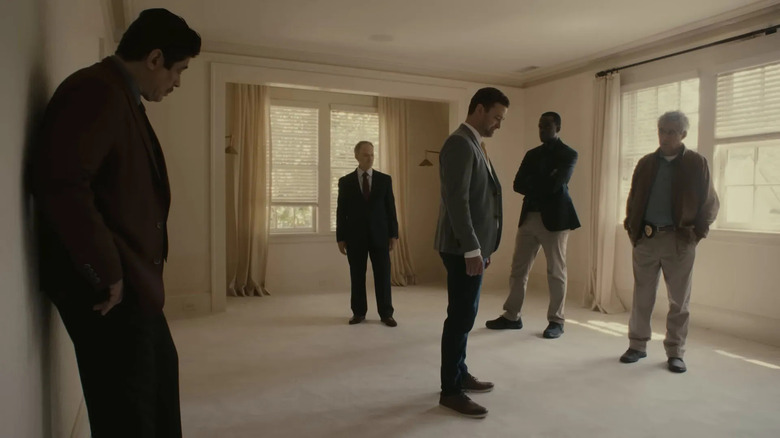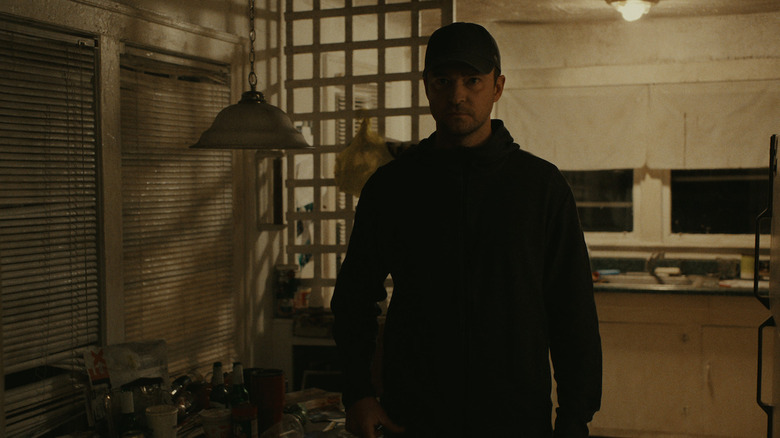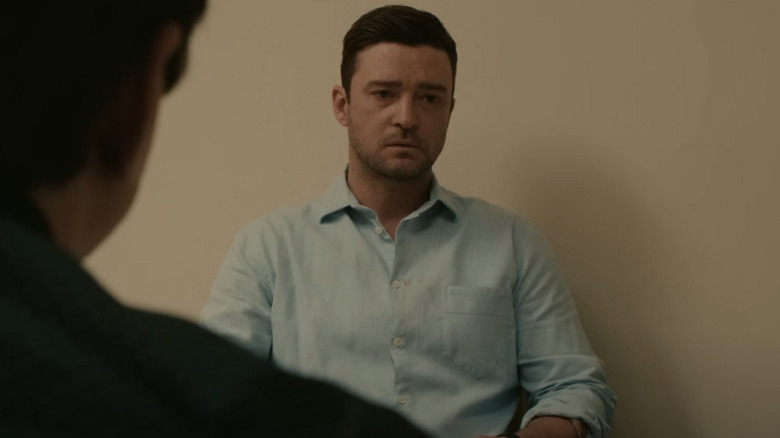Reptile Ending Explained: Cold-Blooded Collusion
Since it debuted on Netflix in early October, the Benicio Del Toro-starring "Reptile" has consistently been one of the top 10 most-watched titles on the streaming platform. The film is the feature debut of director Grant Singer, who cut his teeth directing music videos for artists like The Weeknd, Sky Ferreira, Lorde, Taylor Swift, Sam Smith, Ariana Grande, Ariel Pink, and Skrillex. "I think the movie will be exciting to people who like to watch something where you don't know where it's leading you, where a film is going to have twists and turns and deceive you," Singer said in the film's press release. "And people who like things that are intense and visceral and suspenseful, I think they'll find something exciting in this." Here's the film's official synopsis:
Following the brutal murder of a young real estate agent, a hardened detective attempts to uncover the truth in a case where nothing is as it seems, and, by doing so, dismantles the illusions in his own life.
Audiences have been enjoying "Reptile," which boasts an audience score of 74 percent on Rotten Tomatoes, an improvement from critics who have called the film "muddled" and "messy." At its core, the film is a murder mystery, so while the ending seems like it should be cut and dry, things are not always what they seem in this crime thriller. If you're looking for a breakdown of what the ending of "Reptile" really means, read on for our theories as well as what the director has to say.
What you need to remember about the plot of Reptile
The story starts with Will Grady (Justin Timberlake) discovering that his girlfriend Summer (Matilda Lutz) has been murdered. Summer worked at Will's family real estate agency, so she's a well-connected person in their community. As her romantic partner, Will is immediately (and understandably so) an immediate suspect, but there are plenty of others who would have had a possible motive. For one, Summer's ex-husband is a heroin dealer named Sam (Karl Glusman), and the police don't want to ignore his rap sheet. There's also a grungy stalker named Eli (Michael Carmen Pitt), who blames the real estate firm for his father's suicide after he lost a property.
It's up to detective Nichols (Benicio Del Toro) to solve the crime, along with his partner, Cleary (Ato Essandoh). The case plagues Nichols, and he often brings it home to his wife Judy (Alicia Silverstone), and discusses it with fellow detective friend Wally (Domenick Lombardozzi). But this is not your average whodunnit, as Summer's murder is more than just a solo crime of passion. As Nichols discovers, Summer was killed as a means to keep her from talking to the FBI, as she uncovered corrupt information that would also implicate the police department, in which Nichols works. The Gradys are laundering drugs on the side, and the police are in on it. This puts Nichols in a tough spot, where he no longer knows who he can trust because the corruption goes on even deeper than he realizes ... including with his wife's uncle, the police captain.
What happened at the end of Reptile?
A flashback scene reveals that statistics are statistics for a reason, and that Will Grady likely killed Summer. He is seen standing over Summer's dying body, indicating that he is the one who performed the act. If he didn't, at the very least, he knows with certainty who did. Nichols is able to trace a burner phone back to Will, and the flashback scenes confirm her death is part of a much bigger plot. Summer recognized a duct-taped brick of heroin seized on her ex-husband's property as one that was already seized in an unrelated drug bust, meaning someone was not only setting him up but that the house seized by the police where they found the drugs and eventually sold to her boyfriend and his mother at a fraction of the cost, was done so illegally.
She realized that her boyfriend was the broker on the house, and intended to call the FBI to inform them what she knew, without having to deal with the local police, who were also involved. Will's mother Camille (Frances Fisher) had been collaborating with corrupt cops by seizing properties that were the sites of drug raids, allowing them to turn a massive profit on the real estate market. "Wally plants the dope, and the houses get seized," Nichols tells his wife. Summer was killed so everyone involved could continue breaking the law, but Nichols cracked the case. Will Grady is arrested in the middle of a golf game and taken away for his crimes.
As this is carried out, Nichols has a final confrontation with Wally. As the two have a tense standoff, a frisbee hits the window, sparking the two to shoot at one another. Fortunately, director Grant Singer has confessed what it all means.
What does the frisbee in Reptile mean?
In speaking with The Radio Times, director Grant Singer called the frisbee hitting the window "an act of God," a small reminder that there's still life happening outside of this incredibly serious moment. "Well, first of all, the frisbee is motivated by just these kids playing right outside the house. And this idea that kids playing was like a really ... I think a nice metaphor, a nice counterpoint to what is going to occur inside the house," he said.
"You have this really tense, devastating conversation, moment, experience, convergence that's going to occur, and then outside you have this playfulness of just young people, young kids just having a good time." There's something eerily creepy about the realization that none of us ever really know what's going on in the houses around us, and to see that reflected in this climax helps keep "Reptile" firmly rooted in reality. At the same time, the moment is meant to reflect Singer's approach as a first-time feature director.
"The idea is that I'm the kids playing," he said. "This is my first movie, I'm just enjoying myself, I'm just playing and this is my thing." He continued by drawing a parallel between the kids making eye contact with Nichols through the window, and the way he would make eye contact with his lead actors on set. "That's a moment where like the filmmaker and the actor have this moment of connection," he explained. "And it was a way to kind of create this sort of ... to impart my own perspective and my own experience of making this movie into the experience of the story."
What does the actual end of Reptile mean?
Shortly before Will murders Summer, she discovers a dried snakeskin. This ties into the film's title, "Reptile," and symbolizes the unmasking of all of the characters. We think we know the people we are introduced to, but they soon "shed their old skin," revealing the truth of who they are underneath. Will Grady is presented as a nervous boy-next-door type but is shown to be capable of stabbing his girlfriend to death. (It's also a great way to allow Justin Timberlake to play against type.) Detective Wally seems like a great guy to have a beer with, but is actually a drug kingpin, the ultimate snake killing the "rats" who put his operation at risk. But the biggest transformation comes with Detective Nichols, a rough-around-the-edges cop who seems ripe for corruption, but turns out to be the hero, even if it means bringing people he cares about to justice.
What has the director of Reptile said about the ending?
Director Grant Singer admitted to Tudum that he intentionally left questions in the film unanswered, having said, "One of the things I love about movies is that they can be enigmatic." His goal was not to deliver answers on a silver platter but to keep the mystery alive in the audience's minds long after the credits roll. That said, he did explain some of the decisions behind the story in "Reptile." After it's discovered that Summer was killed as her confession to the FBI would implicate the entire police department, Nichols confides in the people he trusts, who are unfortunately also in on it. "It's more like 'Rosemary's Baby,' where you realize, 'Oh my God, they're all involved,' right?" Singer explained. "What Benicio's character is facing is that he realizes it's much more of a conspiracy, and that there's much more culpability from all these different people that he trusted."
Learning that Nichols' confidants are all a part of the murder is a difficult reality to process, and is the thematic element that gives the film its title. "There's a shedding of skin that occurs, and it felt like an appropriate metaphor for the film," Singer said. "Some of the most unethical people in the film can be very likable in moments." The expression "cold-blooded" is colloquially used to describe people who are deliberately callous or unempathetic. It also gets its name from cold-blooded animals, like reptiles, whose body temperature reflects that of the environment to survive, only showing warmth if provided with it first.
"I love one-word titles," Singer also said. "Titles like 'Heat,' 'Casino,' just things that feel bold. When that title came to me, it didn't remind me of any other movie." He's got a point. Save for "Anaconda" or "Alligator," films that deal with literal animals instead of metaphorical ones, "Reptile" is in a category all its own.





